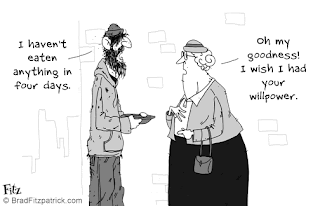The New England Journal of Medicine in a 2007 study said that 40% of all deaths are attributable to personal behavior. Citing the decrease in tobacco consumption as an example of positive change, the study suggests we can do better in the area of self-regulation. But to combat obesity, public health officials have their work cut out for them. The pre-frontal cortex of the brain needs to be trained to work for us so we can commit to controlling our desires..
Our focus at Know Food Now, the simple task of making healthy eating decisions, according to McGonical is not simple at all. Even if we use our higher brain functions, it requires 227 discrete choices to feed ourselves each day. Exercising will power over each decision is exhausting so it's easy to understand why we cop out and grab what's in reach. The solution is stocking our refrigerators with healthy food to eliminate temptation and bad choices.
Scientists can see the relationship between the brain's impulse and control centers in real time using functional magnetic resonance imaging. But since we are not consuming food as an experiment, we need to pay attention to what we eat and how we eat. Charles Duhigg, author of The Power of Habit, says the "golden rule of habit change is to keep the old cue (the signal that leads you to initiate a routine) and the old reward (the gratifying experience that reinforces the routine) but insert a new routine in place of the old one."
The willpower instinct is about changing our habits to produce positive results. Behaviors that make us less impulsive can be acquired through practice and basic behavior modification techniques. Train yourself like Pavlov trained his dogs. Just make sure the rewards you use are not food.








1 comment :
As an RN I am surprised that the rate is 40%, I would think it would be higher.
Post a Comment